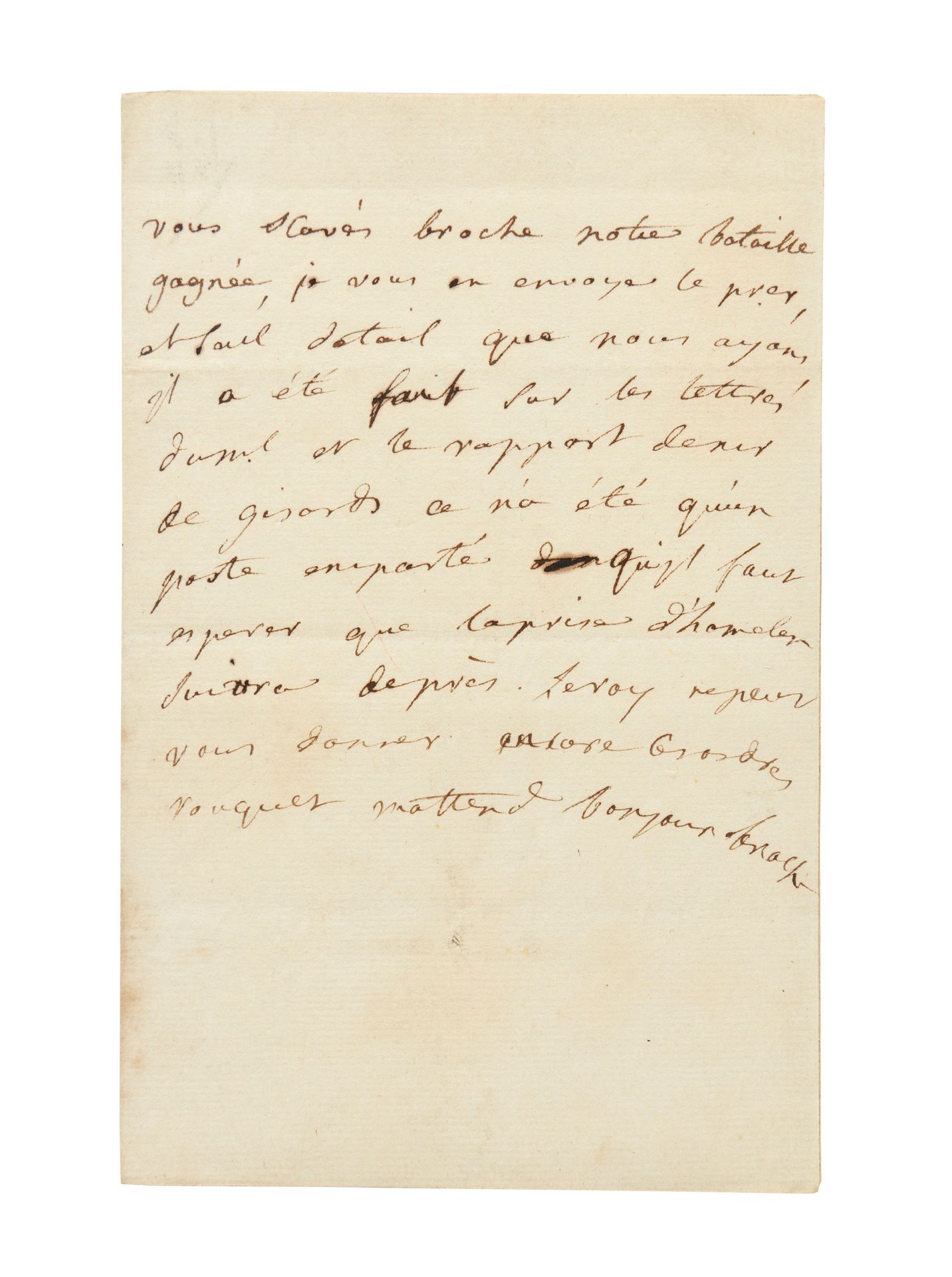Description
POMPADOUR (Jeanne-Antoinette Poisson, marquise de). Autograph letter [TO THE DUC DE LA VALLIÈRE, Louis-César de La Baume Le Blanc]. S.l., [late July or early August 1757]. 3/4 p. in-12. "You know, Broche [Madame de Pompadour affectionately called him "M. de Broche", "Broche" or "Brochet"], our battle won, I send you the first and only detail we have, it was done on the letters of the m[arécha]l and the report of mr de Gisords [Louis-Marie Fouquet de Belle-Île, count de Gisors, son of the marshal de Belle-Isle, commander of the carabiniers]. It was only a post taken [the Hanoverian army was able to withdraw in good order], which we must hope that the capture of Hamelen will follow closely. The King cannot yet give you [his] orders. Fouquet awaits me. Good morning, Broch. INTERESTING TESTIMONY TO THE MARQUISE DE POMPADOUR'S INVOLVEMENT IN COURT CABALS. While France was engaged in the Seven Years' War, Marshal d'Estrées, Louis-Charles-César Le Tellier, led an offensive against Hanover, of which the kings of England were Electors, and won the victory of Hastenbeck on July 26, 1757, near the town of Hamelin (Hameln). However, he was the target of a smear campaign at the Court, orchestrated by the d'Argenson clan and by the Marquise de Pompadour, who wanted to push their favorites to replace him. This cabal led to his dismissal on July 25, 1757, which he learned the day after his victory. The marquise de Pompadour minimizes the battle of Hastenbeck by evoking it as a simple "carried away post". THE DUKE OF LA VALLIÈRE, CLOSE TO LOUIS XV AND LA POMPADOUR, WAS ONE OF THE GREATEST BIBLIOPHILES OF HIS TIME. He rented his castle of Champs-sur-Marne to the marquise.
17
POMPADOUR (Jeanne-Antoinette Poisson, marquise de). Autograph letter [TO THE DUC DE LA VALLIÈRE, Louis-César de La Baume Le Blanc]. S.l., [late July or early August 1757]. 3/4 p. in-12. "You know, Broche [Madame de Pompadour affectionately called him "M. de Broche", "Broche" or "Brochet"], our battle won, I send you the first and only detail we have, it was done on the letters of the m[arécha]l and the report of mr de Gisords [Louis-Marie Fouquet de Belle-Île, count de Gisors, son of the marshal de Belle-Isle, commander of the carabiniers]. It was only a post taken [the Hanoverian army was able to withdraw in good order], which we must hope that the capture of Hamelen will follow closely. The King cannot yet give you [his] orders. Fouquet awaits me. Good morning, Broch. INTERESTING TESTIMONY TO THE MARQUISE DE POMPADOUR'S INVOLVEMENT IN COURT CABALS. While France was engaged in the Seven Years' War, Marshal d'Estrées, Louis-Charles-César Le Tellier, led an offensive against Hanover, of which the kings of England were Electors, and won the victory of Hastenbeck on July 26, 1757, near the town of Hamelin (Hameln). However, he was the target of a smear campaign at the Court, orchestrated by the d'Argenson clan and by the Marquise de Pompadour, who wanted to push their favorites to replace him. This cabal led to his dismissal on July 25, 1757, which he learned the day after his victory. The marquise de Pompadour minimizes the battle of Hastenbeck by evoking it as a simple "carried away post". THE DUKE OF LA VALLIÈRE, CLOSE TO LOUIS XV AND LA POMPADOUR, WAS ONE OF THE GREATEST BIBLIOPHILES OF HIS TIME. He rented his castle of Champs-sur-Marne to the marquise.
